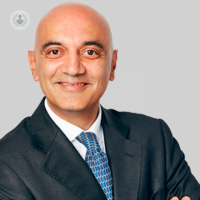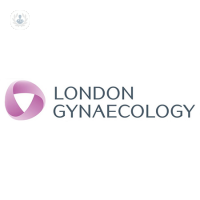Endometriosis
Mr Angus J.M. Thomson - Obstetrics & gynaecology
Created on: 11-13-2012
Updated on: 03-06-2024
Edited by: Karolyn Judge
What is endometriosis?
Endometriosis is a painful disorder where tissue that usually lines the womb (endometrium) is found outside of the uterus and in other parts of the body.

The tissue appears in the abdomen, on the ovaries, fallopian tubes, and ligaments that support the womb. Other areas for these growths may include:
- the bladder;
- bowel;
- Vagina;
- cervix, and
- vulva.
In rare cases of endometriosis, they are found in the lung, diaphragm, thigh or other locations.
What causes endometriosis?
The cause of endometriosis remains unknown. Some experts suggest that endometriosis occurs due to a process called retrograde menstruation. The menstrual blood flows back through the fallopian tubes into the pelvic cavity instead of leaving the body through the vagina. Another theory for the cause of endometriosis is that hormones transform cells outside of the womb into cells similar to those lining the inside of the uterus (endometrial cells).
What are the symptoms of endometriosis?
The symptoms of endometriosis can vary with some women are more affected than others. These can include:
- Period pain that is not relieved by painkillers.
- Heavy periods
- Infertility
- Pelvic pain – this can occur just before the period or all of the time.
- Pain during and after sexual intercourse.
- Pain when going to the toilet.
- Blood in the stool
- Fatigue
- Gastrointestinal upsets - diarrhoea, constipation and feeling nauseous.

What is 'endo belly'?
'Endo belly', or endometriosis bloating, describes the sensation of painful swelling and bloating associated with endometriosis.
Endometriosis may cause abdominal bloating due to various reasons:
- The build up of endometrial-like tissue can cause inflammation, which can result in bloating, water retention and swelling.
- When endometrial-like tissue covers, or grows, into the ovaries, trapped blood can form cysts which may cause bloating.
- Digestion issues such as constipation and gas are often caused by endometriosis.
- Small intestinal bacterial overgrowth (SIBO) and fibroids are conditions that those with endometriosis are more likely to have, and can lead to bloating.
Severe bloating, especially during or right before your period, is the main symptom, but there are various other 'endo belly' symptoms:
- diarrhoea;
- constipation;
- nausea;
- pain from gas.
Management of 'endo belly' includes lifestyle changes, particularly your diet. You should avoid inflammatory foods such as gluten, dairy and caffeine, while increasing fibre intake, drinking peppermint tea and following a low FODMAP diet can help to relieve symptoms.
Other treatment options for 'endo belly' are based in the management of endometriosis.
What does endometriosis feel like during ovulation?
One of the things that endometriosis can cause is pain during the time of ovulation, and patients are much more likely to take painkillers.
Endometrial ovulation pain is located in the lower abdomen on either side, below the belly button and above groin level. It can be constant pain that may last between 12 and 48 hours.
Can endometriosis go to the bowels?
The bowel, in both the abdomen and pelvis, can be affected by endometriosis. This comes in two forms; superficial and deep.
- Superficial
This is found on the bowel surface.
- Deep
When the endometriosis penetrates the bowel wall.
Also, rectal-vaginal nodules can begin as superficial endometriosis in some cases and it can move into the bowel wall.
Bowel endometriosis symptoms include:
- Rectal bleeding during your period
- Deep pelvic pain during sex
- Pain when opening the bowels
Treatment for bowel endometriosis can include painkillers and hormonal treatments. However, more severe cases can lead to surgery. The main surgical options are:
- Nodules or affected areas being shaved off the bowel, leaving it intact. This can, however, lead to residual endometriosis.
- The disc of the affected bowel can be cut away, followed by the closure of the hole in the bowel, in smaller surfaces areas of endometriosis.
- The section or segment of the bowel is removed, and then the remaining bowel is re-joined.
How is endometriosis diagnosed?
The main, and most definitive, way to diagnose endometriosis, is by laparoscopy. This is when a camera is inserted into the pelvis via a small incision in the stomach. Then the camera is used by the surgeon to see the pelvic organs and look for signs of endometriosis.
Scans, blood tests and internal examinations, even if they have normal results, are not a conclusive way to diagnose endometriosis.
Diagnosis of endometriosis can be difficult because its symptoms are very similar to other common conditions, so it's very important to share as much information about your condition as possible.
What's involved in endometriosis treatment?
A laparoscopy can help to diagnose endometriosis, which usually shows the location, size and extent of the growths. There is no cure for endometriosis but there are treatments that ease the symptoms. These treatments include:
- Anti-inflammatory painkillers and pain management strategies.
- Hormone medicines and contraceptives – the combined pill, the contraceptive patch and the intrauterine system (IUS).
- Surgery
What's involved in surgery for endometriosis?
Surgery for endometriosis may be very beneficial but unfortunately symptoms can recur. There are different types of surgery which depend on symptoms and treatment goals, including fertility. Surgery aims to remove or destroy the deposits of endometriosis and is usually done using a laparoscopy. The endometriosis can be cut out by the surgeon or it can be destroyed using heat or laser. More complex surgery may involve different organs of the body that are affected by endometriosis, such as the bowel, bladder, or ureters. This type of surgery can involve treatment by a gynaecologist, colorectal surgeon and a urologist.

The most radical endometriosis surgery may involve having a hysterectomy, which is the removal of the womb, and/ or oophorectomy, which is the removal of the ovary, or ovaries, and/or a bowel resection, which involves removing a portion of the bowel. Having either a hysterectomy or oophorectomy is a big decision as these procedures are irreversible and are only suitable if a woman has completed her family.
Which specialist treats endometriosis?
Obstetricians and gynaecologists, endocrinologists and gastroenterologists are all specialists that treat endometriosis.
















